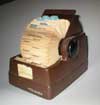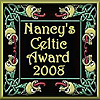| |

Traditions, folklore, history and more. If it's Irish, it's here. Or will be!
"People will not look forward to posterity who never look backward to their ancestors."
-Edmund Burke




Quotes
Library: Books, Movies, Music
Prints & Photos
Poetry
Jokes


Shops Ireland
Bunús na Gaeilge
(Basic Irish)
Circle of Prayer
Blessings
Did You Know?
Himself/Herself
Write to Us
Readers Write..
Links/Link to Us
Advertise with us
Awards & Testimonials
Submissions Guide


|
|
|
A Letter from America
by John B.Mc Cabe
 One day the postman brought a letter from America. This was not an unusual event since my uncle Pat lived there, twice married and had two families with whom we ritually corresponded at Christmas and Patrick's day. This day the letter was different as it announced that one of our cousins, Mary Jane and her husband John would call to visit us for a day in August of that year. It was 1959 and my parents were struggling with bad health, bills and the crushing bondage of small farming life, not counting the liability of two children aged seven and nine. One day the postman brought a letter from America. This was not an unusual event since my uncle Pat lived there, twice married and had two families with whom we ritually corresponded at Christmas and Patrick's day. This day the letter was different as it announced that one of our cousins, Mary Jane and her husband John would call to visit us for a day in August of that year. It was 1959 and my parents were struggling with bad health, bills and the crushing bondage of small farming life, not counting the liability of two children aged seven and nine.
I was very excited. I thought it was wonderful to have 'Yankees' come to see us. There was a sense of romance in those far off places where people acquired fancy accents, drove big cars and seemed to have no end of money to spend when they came home.
For my parents the letter brought a mixture of excitement and panic. Panic was the dominant feeling and it rose, slowly at first, until it became a huge wave that engulfed the whole household. It washed away the every-day disguises of living and revealed the family, the house and the farm in their most tattered rags of inadequacy. My mother looked at her pale face in the mirror, at daddy's patched corduroys, at the bare cement floor, the blackened range, the shortage of proper cups and saucers. She felt the shame of the enamelled chamber pot and the lack of running water.
In desperation she sighed and said: 'What are we going to do?' My father muttered to himself and began mixing paint.
Our house was not a bad home. It was just never finished.
The kitchen walls were layered with great coats of whitewash - frantically applied by my mother for the annual visit of the priest for the 'Oats Collection'.
The room off the kitchen was very damp and remained unused except as a dumping ground for unwanted items, a safe place for bicycles and the storage of animal medicines. It was furnished with two large chests - the forlorn trousseaus of departed bridal ancestors.
To this day I do not know where daddy purchased the paint with which he intended to adorn our home. Wherever he found it, it was cheap and the colours of such a mad variety as to be more suited to the enhancement of a circus than to the decoration of a dwelling house. Maybe, perhaps, he was affected by the popular perception that Yankees have a penchant for flamboyant and garish colours but whatever the reason mammy was not impressed.
The front door wore a new coat of screeching yellow that I have only since seen on the glorious apparel of tropical parakeets. It looked awful. It had to be changed.
'Waste not, want not', he said, and proceeded to mix the remaining yellow with signal red to produce a colour that found no echo in the normal range of the spectrum - an off-chocolate pink which was less offensive on the eye and adorned the door for most of a generation.
When the painting was finished, my mother surveyed the cutlery. She went to town and arrived home with a new set of cups and saucers and a matching milk jug. These were very pretty, made of white china with blue and gold bands on the rims of both cups and saucers. We were not allowed to touch them in case they got damaged and she placed them lovingly on the dresser with as many admonitions as would befit the protection of a Pharaoh's tomb. A new oilcloth for the table was also purchased along with some smaller items of necessity.
Finally, when all the preparations were made our cousins were invited so that both my mother's and my father's families were met together to welcome and fete the arrival of the Yanks.
They arrived. They talked. They took pictures. They left.
It was a terrible let down. My mother was so crestfallen, when, at the end of the day, the Yanks called for us, the children, and said they would like to give us 'a coin'! They placed a two-shilling piece in each of our hands. Not even the scent of a single dollar!
I still look at the strained faces of my parents in the fading photographs and feel the awful pain of a vanishing dream.
The Yanks were, of course, very nice and plain and friendly. They were on a package tour and made the effort to come and see us and we were glad. I suppose deep down, we all expected some reward, some gift of money or presents from these, to us, exotic and wealthy people. We did not imagine in all our poverty and penury that they too were but young struggling people with little or no means either, who made an effort to say hello from across the world - reflecting the homesick eyes of a father looking at the home he had left half a century before.
The visit of these American cousins became a reference point in the inner circle of our world and from then on time was reckoned by that event as before and after the Yankees arrived.
A Letter to Ireland
by Bridget Haggerty
When we read John McCabe's Letter From America, we were reminded of a trip home we took ourselves. It was to be the first time back for Bridget since she was a child, and all of the cousins she once played with were all grown up, with children of their own.
When we knew for sure exactly when we'd be in the country, Bridget wrote to the one address she had for a cousin in Dublin. Back came a somewhat formal note saying she and several others in the area would be happy to see us.
We then set about making the arrangements. There are quite a few relatives scattered throughout Co. Dublin and Co. Carlow, but in the end, just five cousins met up with us at the Royal Dubliner Hotel on a Saturday afternoon.
It was quite the occasion, with lots of drinks flowing, plates heaped high with sandwiches and a constant stream of chatter from a half dozen women who had decades of news to share. Mercifully, one cousin had brought her husband, so he and Russ allowed the women to natter away while they discussed more manly affairs, i.e. the best way to get from Dublin City to Cork City by that evening.
In retrospect - and especially after reading Mr.McCabe's article, it dawned on us that our reunion had been successful for one particularly good reason. We went out of our way to ensure that no-one was going to have to put themselves out just because the “Yanks” were coming.
Even though Bridget wanted to see the cottage where her mother and grandparents had lived and which was still occupied by one of the relatives we were meeting, we were careful not to mention it. Had we asked, we knew that as hospitable as the Irish are, the answer would have been yes - and that would have set in motion a flurry of preparations.
For this first meeting after so many years, we wanted people to feel relaxed and not in the least bit burdened by the prospect of entertaining out of town guests. And that is how it turned out - a lovely afternoon enjoyed by all; addresses were exchanged, promises to write were made, and then the invitation was extended by one of the relatives to have dinner with them the next time we were home. The Irish have an uncanny way of sensing things and perhaps they knew only too well we wouldn't be back for quite a while. Certainly, they'd have plenty of time to prepare for our next visit!
All these years later, we learn no-matter where you might be headed - Ireland or anywhere else - it's only good manners to reverse the order of hospitality. Invite them to join you at a restaurant or pub - and always be mindful to pick up the tab.
Note: We are very grateful to John for giving us permission to reprint this story which was first published in the June 2003 issue of the Ireland Information newsletter.
John's Bio:
John was born in Co. Monoghan and grew up in a small farming community - "Patrick Kavanagh country." An honours graduate in Arts from the National University of Ireland, John also holds a degree in Divinity from the Pontifical University of Ireland and has developed a deep interest in the rich, spiritual dimension of "Gaelic Tradition".
Professionally, he has worked in education, has broadcast for the BBC, and has also written and published poetry and articles in a number of periodicals and magazines.
Personal interests include photography, writing, poetry, fishing, reading, history, and literature - especially the works of R.S. Thomas, Dylan Thomas, Seamus Heaney, Paul Durcan and any other poets of current interest.
He and his wife, Margaret, live in a 200-hundred year old house with a long history. "Visitors are welcome. Much to see and much to enjoy."
Images: AirMail envelope from google images.
|
|
Fri, Sep 27, 2024
 The Galway Hooker The Galway Hooker
This unique vessel, with its distinctive curved lines and bright red sails, originated in the village of Claddagh. During the 19th century, hookers supported a significant fishing industry and also carried goods, livestock and fuel. Seán Rainey is remembered for building the last of the original boats, the Truelight, for Martin Oliver who was to become the last king of the Claddagh; as king, he was entitled to white sails on his boat. Since the mid seventies, many of the old sailing craft which were on the verge of extinction have been lovingly restored and new ones have been built. During the summer months they can be seen at festivals such a Cruinniú na mBád - the Gathering of the Boats - in Kinvara.
Click for More Culture Corner.
We have this book and it's a gem. We now wish we had this up-dated edition. But don't take our word for it - here's another opinion from an amazon reviewer: This is not your average travel book containing descriptions of places, events, lodging, exchange rates, etc. Instead, it gives the nitty gritty on how to conduct yourself in your day-to-day life. Especially enjoyable was the chapter entitled "Paddies", which gives a valuable groundwork in dispelling myths and stereotypes surrounding the Irish and Ireland. Entertaining and informative, this book will help visitors to Ireland get more out of their visit.
Click here for Culture Shock.
|
|
|




 The Galway Hooker
The Galway Hooker